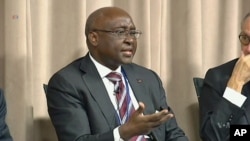A top African economist offered harsh words for leaders in Burundi, where President Pierre Nkurunziza's efforts to stretch his constitutional term limit have triggered violence, protests and a coup attempt.
Speaking exclusively with VOA on the sidelines of the 2015 African Union Summit in Johannesburg on Saturday, former African Development Bank chief Donald Kaberuka, a Rwandan economist, was candid about his thoughts on the small central African nation with which his countrymen share a violent history.
Both nations suffered through ethnic civil wars, and both are still ruled by their respective first post-conflict leaders.
“I deplore the situation [in Burundi]," he said. "The country has gone through years of turmoil and mayhem. And through the peace agreement they signed in Arusha (Tanzania), they found a solution. It was working for the country. The country was picking up the pieces, economically and socially.”
The renewed political instability, however, has had drastic economic consequences that mirror those that emerged in the wake of political conflict in the Central African Republic in 2012.
“Now, [Burundi is] throwing all of it all away, including some of the investments which we ourselves have done," he said. "We’ve been supporting them through the budgets, through infrastructure, through our fragile support facility. Now, they are throwing it away, like people in the Central African Republic did ... and I hope the leaders of that country understand that they have very important historical responsibilities.”
Since vacating his African Development Bank post after 10 years in May, Kaberuka said he remains optimistic about the continent’s economic future, predicting that a dozen African nations would see gross domestic product grow more than 7 percent this year, and that another half-dozen nations will see growth between five and seven percent.
But every nation has challenges, and he warned African leaders to be mindful of correcting longstanding economic inequalities.
“Where we have challenges are in three areas," he said. "The first one is in terms of maintenance of market economic stability, to be able to resist in case of international shocks in the system. So we need to make sure we have enough reserves, we control the deficits, we control borrowing to make sure that the economy’s foundations remain strong in case of a global economic crisis."
Other primary challenges include creating "socially sustainable," inclusive economic growth planning, and ensuring access to trade and capital markets.
African leaders will continue to meet throughout the weekend.




